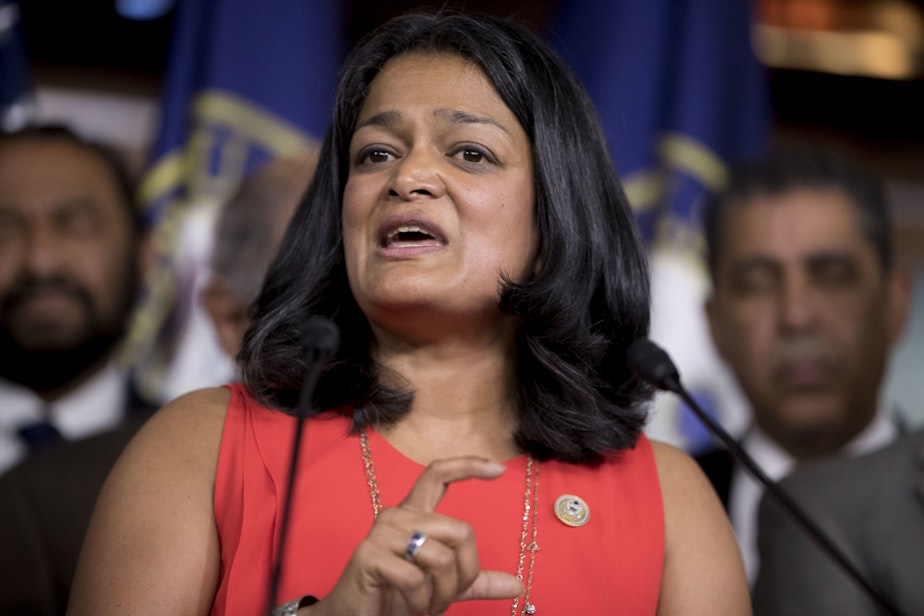Reining in tech giants could happen with Jayapal-sponsored antitrust bill

A bipartisan effort in the U.S. House of Representatives seeks to check the power of four tech giants: Amazon, Apple, Facebook, and Google. That check of power could happen with a bill called the Ending Platform Monopolies Act. If it passes, it has the potential to break up Amazon.
Seattle Congresswoman Pramila Jayapal is the vice-chair of the House antitrust Subcommittee. She told KUOW’s Kim Malcolm why she sponsored the bill.
This interview has been edited for clarity.
Kim Malcolm: What is the problem that this bill is trying to solve?
Rep. Jayapal: It's really a structural solution to a structural problem. It says that you can't have conflicts of interest that arise if you own a platform and if you then have multiple lines of business that engage on that platform. It would be sort of like being the referee on a field and at the same time playing for one of the teams.
This says you can't do that anymore. These dominant platforms have monopoly power and have this almost irresistible urge to compete with the very businesses that are on their platform trying to also make it. This is ultimately saying that it would make it unlawful to both be a platform and then also compete on that same platform.
So when it comes to a company like Amazon owning a marketplace, and then selling their own products on that marketplace, that is an unfair advantage for them?
Sponsored
That's right. And we have to understand that this is also about all of the data that's collected from those third-party sellers that are on the Amazon platform. It isn't just like going into a grocery store and you see the Safeway Select brand, but you also then have other competitors. They don't have the ability to collect data in the way that Amazon does, and they don't also have the ability to set the price for those products in the way that Amazon does.
They don't have, for example, the ability to say you're going to buy this product because it is in the ‘buy’ box. That's something that Amazon does. And of course, the most important thing, this is not just about Amazon, right? This is really about all monopolies in the tech sector that hurt small businesses, hurt consumers, and hurt competition.
Amazon has been pushing back on this, saying that this kind of regulation would hurt the third-party sellers on its platform, and that independent sellers benefit from being there, even as Amazon sells its own products at the same time. What do you say to that?
These are similar arguments to what was said at the time that Ma Bell was broken up into the Baby Bells, or even initially when the antitrust lawsuits were filed against Microsoft. I think what we've seen in all these situations is that preserving antitrust regulations strongly, and not allowing dominant companies to have this ability to abuse their dominant power, is actually what allows other businesses to thrive.
There are many small businesses who have come and testified to us, and I think some that were quoted in The Seattle Times the other day as saying, 'Look, we're between a rock and a hard place because this is such a dominant platform that we have to sell on the platform if we want to even make it, but the terms of our selling are completely unfair to us as small businesses.' That reflects what we've heard over and over again.
Sponsored
At the end of the day, we actually believe that strong antitrust legislation like these bills that we're putting forward are what are going to save small businesses, save competition, and it's what we found in the past when fears were put out about the Baby Bells. That's not what happened in the telephone industry. It's not what happened when Microsoft had to regulate its activity through the lawsuit.
In fact, what we've heard from Microsoft is that that change in its business model is actually part of what allowed many of these companies, Amazon, Facebook, others, to grow and thrive. We will have that opportunity for small businesses across the board.
Congresswoman, you've also argued that your bill touches on the future of journalism and a free press here in the United States when it comes to platforms like Google. Can you explain that for us?
Yes. This is a really important issue because we have seen the death of so many independent newspapers across the country. We are fortunate in Seattle to have one of the larger independent newspapers with The Seattle Times. But we have seen the effects of this when we see Google both running the marketplace while also acting on the buy-side and the sell-side all at the same time for advertising revenue, which is so critical to the functioning of independent newspapers.
It's an issue that is very close to home because The Seattle Times and other independent newspapers simply can't survive if they have to cope with a platform like Google controlling everything and taking away the revenue that is so necessary for these independent newspapers to survive.
Sponsored
Listen to the interview by clicking the play button above.





